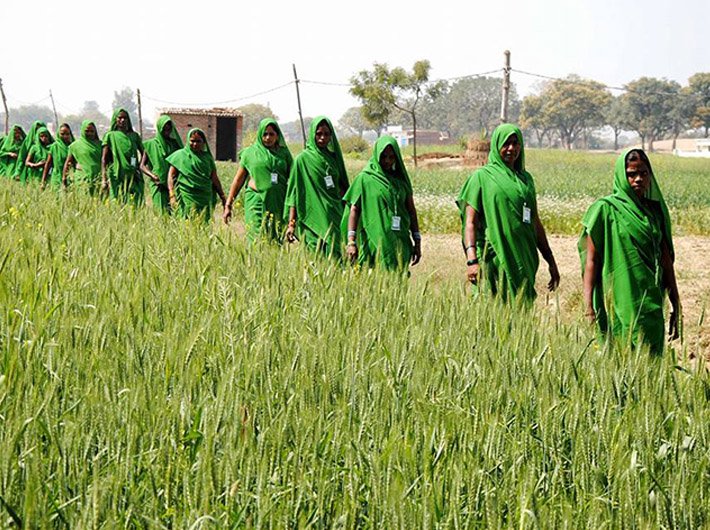A gang of women have banished drug and liquor from Kushiyari village near Varanasi
Like hundreds of other villages in its vicinity, Khushiyari in Varanasi district, was another village lost on the map of India, until a group of women popularly known as Green Gang brought it to public attention.
Dressed in green sarees, these women took the pledge to eradicate drug and liquor addiction from their village. Starting this drive from their homes, the women first persuaded their husbands to leave alcohol. When persuasion failed, the women threatened the men by barging into their houses in large numbers. Now, the entire village has become liquor and drug free.
“Men in our village were addicted to drugs to such an extent that they wasted all the earnings. They even started neglecting their farms. Whatever little they earned, they spent it all on alcohol. Ultimately, the main sufferers were children and women. Finally, we decided to step out our homes and fight the drug menace. Now, men don’t even dare to sit under a tree to play cards and idle away their time, like they did earlier,” says Asha Devi, leader of the Green Gang.
The group initially had 10 members since its inception in December 2015. Now it works with 30 women who want to bring a change in their village. Interestingly, these women have been identified as ‘Police Mitra’ (a volunteering force) by the Uttar Pradesh police. As a result they now keep a check on all kinds of crimes and also see that no rights of men, women and children are violated in the village. “Getting the badge of Police Mitra has further empowered our movement,” Asha Devi says feeling happy with the police backing.
Besides advocating a drug free environment, these women have now involved themselves in encouraging cleanliness, developing infrastructure and promotion of health and healthcare schemes in the village.
“We go door-to-door and inform women about various health schemes and benefits available for them,” says Asha Devi while volunteering at a polio booth in her village.
However, all was not well in the Khushiyari village eight months before. The women who are now part of the Green Gang were even afraid to come out of their houses, a few months back. Like thousands of women dwelling in rural areas of the country, the life of even these women was confined to their households. They could not read and write and were not aware of their rights.
But what changed their position? “The credit for the massive change in our life goes to the students who have been working tirelessly for the development of our village,” Asha says.
In August 2015, few students from the Banaras Hindu University (BHU), Mahatma Gandhi Kashi Vidyapeeth (MGKV) and other universities and colleges from Varanasi voluntarily adopted Khushiyari village, which was another nondescript village in the region.
Ravi Mishra, a post graduate from BHU, who heads the group of 287 students, says, “Development of any village depends on how it treats its women. So we started encouraging women to come out of their confine and get informal education. Initially we taught nine women. Slowly, other women started getting inspired from them and came to attend our classes. At present, 90 women are learning alphabets, calculation and basic general knowledge.”
Once the women started learning about their rights and became aware of development in other villages, they decided to speak against domestic abuse and drug addiction prevalent in their village and thus Green Gang was formed, Mishra says.
The students have also started Hope Welfare Trust under which they carry out all the development works with their own pocket money. “We don’t take any fund from anywhere,” says Mishra.
The village comes under Bandepur gram panchayat which is 10 km from the Varanasi main city. Most of the villages under this gram panchayat are devoid of facilities like health, education and basic infrastructure.
swati@governancenow.com
(The column appears in the May 16-31, 2016 issue of Governance Now)

